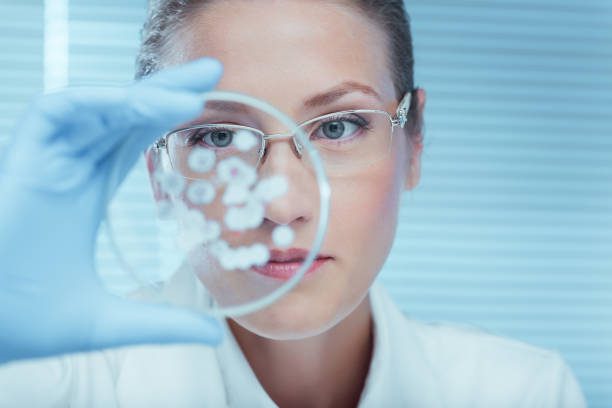| Microbiologist Key Stats | |
|---|---|
| Avg. Salary / year | $95,200 |
| Avg. Pay / hour | $45.77 |
| Education | 4+ Years |
| Job Outlook | 8.2% |
| Total Employed | 19,760 |
When you become a microbiologist, you will research the behaviors and characteristics of microscopic organisms such as bacteria or algae.
Microbiology is a branch of biological science.
Medical microbiologists study the relationship between these organisms and diseases, and work to develop antibiotics.
Microbiologists for the most part work in research with many working in pharmaceutical development.
Some work in environmental research, and study the role of tiny organisms in eco-systems.
Many are employed in colleges where they both teach and research.
Go to Page Section:
Education Requirements of a Microbiologist
The education you need to become a microbiologist will depend on the kind of work you would like to be doing.
While you’re at high school it’s important to take science subjects, such as biology, as well as math.
The minimum requirement to work in this field is a four year biological science degree, with a focus on microbiology.
This qualification would be enough to qualify you for a position as a research assistant, or for a role with a pharmaceutical company.
If you are interested in completing independent research then you will need to complete doctoral level qualifications.
After your undergraduate degree, you will need to go on to graduate school.
You may be able to start work on a PhD immediately, or in some instances start a master program first and then a PhD afterwards.
This qualification would give you the background to work independently as a microbiologist.
You could gain a position teaching and researching in a college and work towards tenure.
You would spend a good amount of time teaching, and the remainder conducting research.
Another path is to apply for grants to fund your own research.
Microbiologist Job Description
Microbiologists work in varied settings.
Depending on the kind of industry that they work in, the job they do could vary greatly.
Here are some of the roles you could work in when you become a microbiologist:
- Environmental microbiology
- Food microbiology
- Agricultural microbiology
- Industrial microbiology
- Immunology
- Bioinformatics
- Pharmaceutical development
Many microbiologists will work within a lab setting, where they will complete tests.
Some work in offices, writing reports and analyzing data.
Some could work in development, for instance creating new antibiotics and anti-viral drugs.
Many microbiologists work in colleges, where they both work with students teaching, and conduct their own research.
Those that work in research could spend their time studying in the field, conducting lab work, and writing up their findings.
Those that publish their work would need to adhere to strict deadlines.
Most microbiologists will work a forty hour week.
Some may work overtime, particularly if working towards a deadlines.
Microbiologist Salary and Career Path
Working in research, it’s likely that your first job when you become a microbiologist would be as a research assistant.
Once you had completed your postgraduate studies you could go on to an assistant instructor’s position at a college.
You could then work towards achieving your tenure, which generally takes about seven years.
Those who work within research would be employed with a bachelors degree and would work on a wide range of projects, most likely in a lab setting.
Some may go on to become head researchers or project managers.
Others may move into managerial or supervisory positions.
Some microbiologists go on to work within education.
They may take up a position as a high school science teacher, for instance.
Those that work in the pharmaceutical industry often go on to other positions with health.
The median salary of a microbiologist is $64,000 year.
The highest 10% of earners made over $111,000, while the lowest 10% made less than $38,000 a year.
You can find out more about a career in microbiology from the American Society for Microbiology.
Some similar jobs to that of a microbiologist include
- Biologist
- Botanist
- Atmospheric scientist
- Medical researcher
- Medical doctor
- Epidemiologist
Working as a microbiologist givers you a wide range of career prospects.
When you become a microbiologist you open up many opportunities within science, health, and education.
A qualification in this area means that if you become tired of one area, there are more pathways that you might choose to follow.
There is growth is some parts of this field, good salary, and secure employment for successful people.
![]() The below information is based on the 2024 BLS national averages.
The below information is based on the 2024 BLS national averages.
National Average Salary
$95,200Average Salary by State
| State | Avg. Annual Salary |
|---|---|
| Alabama | $65,500 |
| Alaska | $76,400 |
| Arizona | - NA - |
| Arkansas | $80,590 |
| California | $115,910 |
| Connecticut | $84,580 |
| Delaware | $83,580 |
| Florida | $79,790 |
| Georgia | $103,880 |
| Hawaii | $68,760 |
| Idaho | $71,760 |
| Illinois | $81,310 |
| Indiana | $86,560 |
| Iowa | $89,470 |
| Kansas | $69,220 |
| Kentucky | $69,750 |
| Maine | $91,260 |
| Maryland | $108,870 |
| Massachusetts | $119,850 |
| Michigan | $75,600 |
| Minnesota | $93,380 |
| Mississippi | $88,120 |
| Missouri | $76,440 |
| Montana | $100,700 |
| Nebraska | $94,960 |
| Nevada | $74,560 |
| New Hampshire | $88,670 |
| New Jersey | $90,300 |
| New York | $94,660 |
| North Carolina | $92,260 |
| North Dakota | $65,070 |
| Ohio | $83,090 |
| Oregon | $89,540 |
| Pennsylvania | $77,100 |
| South Carolina | $67,130 |
| South Dakota | $89,790 |
| Tennessee | $83,280 |
| Texas | $69,020 |
| Utah | $74,750 |
| Virginia | $99,870 |
| Washington | $81,970 |
| Wisconsin | $71,630 |
| Puerto Rico | $61,060 |
The highest-paying state in this field is Massachusetts, with an average salary of $119,850.
Here are the five states with the highest salaries in the field:
* Employment conditions in your area may vary.
Frequently Asked Questions
What does a microbiologist do?
A microbiologist is an individual who studies the characteristics, growth, and development of microscopic organisms (algae, fungi, bacteria…).
In most cases, microbiologists work in laboratories and offices.
The typical responsibilities of a specialist usually include planning and conducting complex research projects; supervising the work of other workers and evaluating the accuracy of the results; isolating and maintaining cultures of microorganisms for future study; monitoring the effect of microorganisms on other living creatures and the environment; identifying and classifying microorganisms; preparing reports and papers based on research findings; presenting research findings, and so on.
Microbiologists that are basic researchers focus on the actual research, while applied researchers are hired by companies and work on products that the companies can, later on, sell.
How much do microbiologists make?
On average, a microbiologist can make a little more than $69.000 per year in the United States.
In case you decide to follow this career path, you can expect to earn anywhere between $40.000 and $118.000 annually.
The salary would certainly depend on a variety of factors – your education and experience level, the employer, the location and so on.
The microbiologists that work in the District of Columbia, California, and Maryland, for example, have the highest average salaries.
An entry-level microbiologist can earn $19 per hour, while a specialist with plenty of experience will make $57 and more.
How much does it cost to become a microbiologist?
You would certainly need at least a bachelor’s degree in microbiology, cell biology, biochemistry or a related field, in order to become a microbiologist.
A year in a university can cost you anywhere between $8.000 and $45.000 (and more); the cost depends on a variety of factors (the books, supplies, and accommodation expenses are not included).
However, the majority of employers will prefer you to have a master’s degree (over $11.000) or a doctorate degree, in case you want to become a professor or focus on independent research in microbiology (a Ph.D. will cost you around $20.000 per year).
What is the demand for microbiologists?
Between 2016 and 2026, the microbiologist job market is expected to grow by 8.2%, according to the Bureau of Labor Statistics.
That is as fast as the national average for all occupations in the United States.
The candidates that hold a master’s or doctorate degree and have plenty of experience in the field will have better job prospects.
The industry is mainly concentrated in California, Texas, and Maryland.
How long does it take to become a microbiologist?
It will take you 4 years to obtain a bachelor’s degree and another 2 years to earn a master’s degree.
A doctorate degree typically takes 5-6 years to acquire.
Laboratory experience is incredibly important for aspiring microbiologists; you might want to consider seeking internships with prospective employers as well.
After receiving a Ph.D., many microbiologists work in a temporary postdoctoral research position for around 2-3 years.














